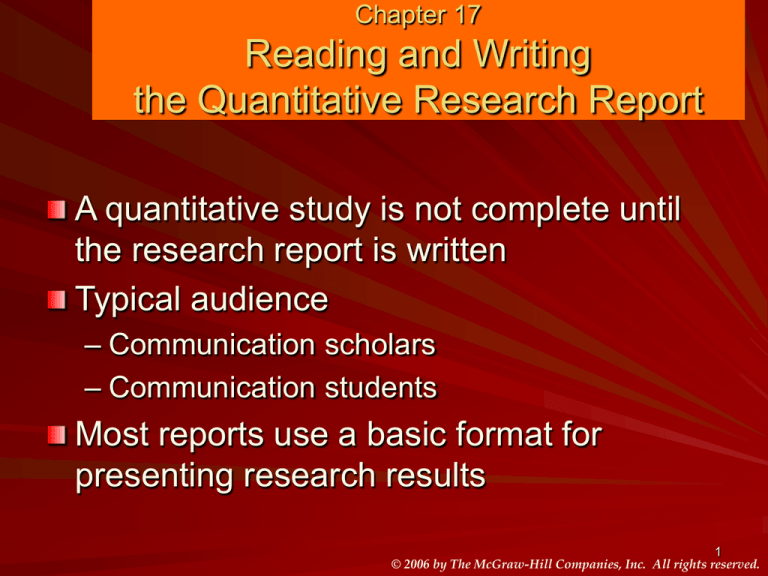
Chapter 17
Reading and Writing
the Quantitative Research Report
A quantitative study is not complete until
the research report is written
Typical audience
– Communication scholars
– Communication students
Most reports use a basic format for
presenting research results
1
© 2006 by The McGraw-Hill Companies, Inc. All rights reserved.
The Literature Review
The framework of the research
investigation
Based on the literature used to design and
develop the research study
– Puts the present study into perspective
Historical overview of the variables studied
Goes beyond description of literature –
includes analysis, synthesis, and critique
2
© 2006 by The McGraw-Hill Companies, Inc. All rights reserved.
The Problem Statement
Positioned near or at the beginning of literature
review
A few sentences that identifies the research
objective
– What is the problem?
– Why is this problem worthy of study?
– Explain why the researchers conducted the study
– Explain why consumers should be interested
3
© 2006 by The McGraw-Hill Companies, Inc. All rights reserved.
Types of Material
In the Literature Review
Findings from empirical research reports
Articles that evaluate or propose theory
Literature reviews that summarize an
expanse of literature on a topic, issue or
theory
How many articles?
4
© 2006 by The McGraw-Hill Companies, Inc. All rights reserved.
Organizing the Literature
Review
1. Chronological order
2. General to specific
3. Contrast-comparison
4. Trend identification
5. Methodological focus
6. Problem-cause-solution
7. Topical order
5
© 2006 by The McGraw-Hill Companies, Inc. All rights reserved.
Characteristics
of the Literature Review
First paragraph should be a road map of
the rest of the literature review
When presenting others’ research
distinguish between assertions and
conclusions supported with data
Use signposts, headings, and transitions
Usually written in third person
6
© 2006 by The McGraw-Hill Companies, Inc. All rights reserved.
Research Questions
and Hypotheses
Placement
– At end of literature review
– As they emerge from the literature reviewed
Each stated separately as a simple
question or sentence
Use H1, H2, or RQ1 or H1, H2, or RQ1
7
© 2006 by The McGraw-Hill Companies, Inc. All rights reserved.
The Methods Section
How was the research study executed?
– Description of participants
Demographic information
Sampling techniques and sample size
– Description of the research procedure
What did the researcher do to collect data?
– Description of variables
Operationalizations
8
© 2006 by The McGraw-Hill Companies, Inc. All rights reserved.
The Results Section
Presented in the order of the research
questions and hypotheses
For each RQ or H
– Statistical test used
– Results of the test
– Significance level of the test
– Description connecting statistical results to
support for or rejection of H or to answer RQ
9
© 2006 by The McGraw-Hill Companies, Inc. All rights reserved.
The Discussion Section
Researcher’s interpretation of the results
– Reconcile the findings as a whole
Not a restatement of the findings
– What do these results mean?
– Implications of the results
Link conclusions back to the literature
Limitations
Future research
10
© 2006 by The McGraw-Hill Companies, Inc. All rights reserved.
Finishing the
Quantitative Research Report
Title
Title page
Abstract
– State overall objective
– Brief explanation of research method
– Brief summary of results
References
– Alphabetical by authors’ last names
– Must adhere to stylistic standards
11
© 2006 by The McGraw-Hill Companies, Inc. All rights reserved.
Using APA Style
Citing others’ work
– Direct citation
– Indirect citation
Creating the reference list
– Complete alphabetical list by authors’ last
names
– Includes all literature cited in the report
– Accuracy
12
© 2006 by The McGraw-Hill Companies, Inc. All rights reserved.
Issues in Writing
Presentation affects how report is received
Common writing problems
– Careless writing
– Unspecified assumptions
– Failure to place study within published
research
– Unclear hypotheses and research questions
– Vague and undefined terms
13
© 2006 by The McGraw-Hill Companies, Inc. All rights reserved.






